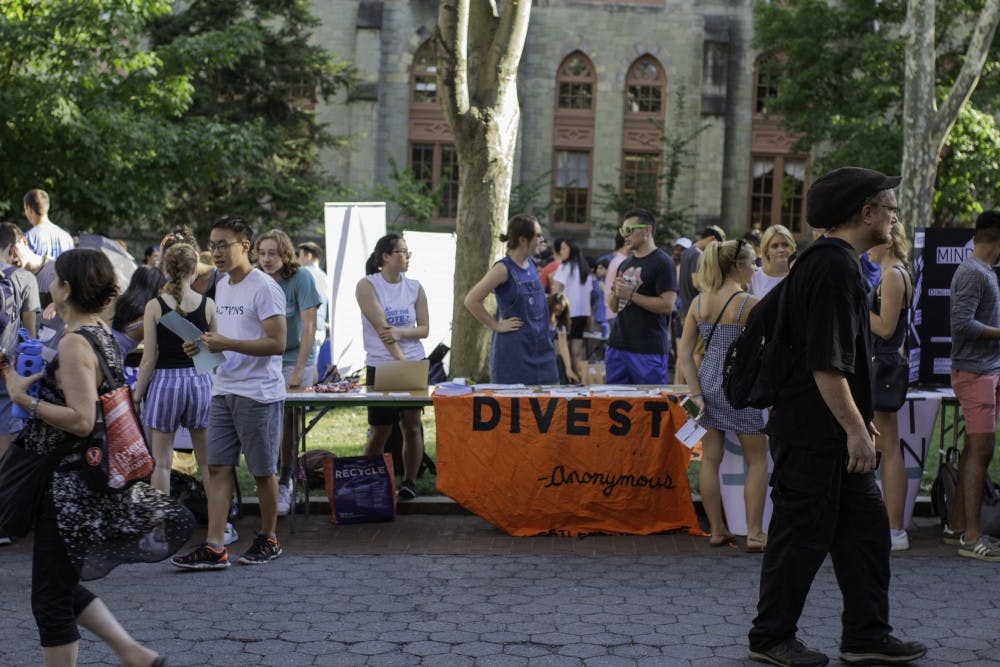
The UA resolution is in line with the goals of Fossil Free Penn, a club founded in 2014 and dedicated to the goal of fossil fuel divestment.
Credit: Sam HollandUniversity investments in fossil fuels have been a topic of contention among administrators and students for the past several years, with the undergraduate group Fossil Free Penn largely leading the battle since its creation in 2014. As of Sept. 9, the Undergraduate Assembly has decided to join the fight.
At the first general board meeting of the year, the UA passed a resolution in support of Penn’s Board of Trustees divesting from companies involved in coal and tar sands, two particularly harmful fossil fuels. The assembly voted with an overwhelming majority of 17 in favor, 1 against the proposal, and 2 abstained votes.
“Having that sort of support, it’s probably one of the biggest demonstrations of student support on campus thus far because the UA is the voice for the student body,” said UA Sustainability and Community Impact Committee Director and College sophomore Ben May, who proposed the resolution.
In early 2015, 87.8 percent of undergraduates voted in favor of fossil fuel divestment in a student body referendum. In September 2016, however, the University’s Ad Hoc Advisory Committee on Divestment decided against divestment despite two years of campaigning from FFP, which at that time called the University to divest from all fossil fuel companies.
UA President and College senior Michael Krone said he feels the assembly’s resolution will yield a more flexible response, however, since it has a refined focus. The resolution asks for the removal of endowment funds from coal and tar sands industries rather than complete divestment from fossil fuels.
Since January 2018, FFP has also narrowed its focus to coal and tar sands. FFP Trustee Coordinator and College senior Zach Rissman explained coal and tar sands as the “most carbon intensive, most environmentally destructive, most socially destructive, and the worst investments.” He said he believes the resolution will “definitely” make an impact.
“This is a much more focused and possible, immediate, pressing concern,” Krone said. While both May and Krone acknowledge the value of total divestment from fossil fuels, Krone explained that it is “a difference between need to have and nice to have.”
Although Rissman met with May and Krone to provide them with background information on the divestment issue, the resolution was an independent UA decision to undertake, proposed and authorized by May.
Rissman, however, said he is excited to see growing support on campus from student groups.
The new resolution could be “exactly what we needed,” Rissman added. “Our goal now is to really gain that critical mass of students to do whatever we need to achieve divestment.”
For the UA, the next step is to plan proper follow through. Krone said he hopes to leverage connections with administrators and continue collecting research for data-based arguments to portray why the student body is pushing for divestment from coal and tar sands.
Despite the passing of the resolution, Krone said the process of actually divesting will likely be a multiyear process. May said the goal is to make the University agree to divest from coal and tar sands this year.
“That’s why the language [of the resolution] was that we want the board of trustees to commit to doing it, not necessarily do it right now because it’s not going to happen right now,” Krone said. “These things take time.”
“If the University truly believes in a sustainable future, and truly believes in the success of the student body, it will divest,” May said.
The Daily Pennsylvanian is an independent, student-run newspaper. Please consider making a donation to support the coverage that shapes the University. Your generosity ensures a future of strong journalism at Penn.
Donate



